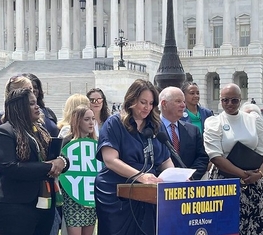At Long Last, Voting Rights Act Restoration to Get a Vote on House Floor
It’s been over 6 years since the U.S. Supreme Court, in their decision of Shelby County v. Holder, gutted a key provision of the Voting Rights Act (VRA). The decision by the court invalidated parts of the VRA that were designed to protect voters from racial discrimination at the polls. The court did away with the process known as “preclearance” which required jurisdictions with a history of discrimination across the country to obtain approval from the U.S. Department of Justice when implementing new laws related to voting and elections.
Since 2013, more than 16 states passed bills that made it more difficult for African Americans and other communities of color to access the ballot box. These obstacles including restrictive voter identification laws and cuts to polling places led to an increase in voting rights challenges. Organizations like the League have persuasively argued for why upholding the protections within the VRA is key to ensuring access to the voting booth.
Passage of the VRA was one of the most important legislative actions of the 20th Century. It was a direct response to the discriminatory tactics, like literacy tests, intimidation, threats, and violence used to prevent people of color from registering and voting. The preclearance section of the VRA was the necessary enforcement for the 15th Amendment’s guarantee that no citizen would be denied the right to vote because of the color of their skin.
Legislation that responds to the Shelby decision will now come to the floor of the U.S. House. H.R. 4, the Voting Rights Advancement Act (VRAA), has broad support from civil rights and voting rights groups across the country. It reacts to the new forms of discriminatory laws passed since the Shelby decision that make it harder for many communities to vote. Throughout 2019, Congress has held hearings in states around the country that gathered evidence about voter suppression. The House Judiciary Committee also held seven hearings collecting evidence from expert witnesses about the barriers to voter participation that remain for people of color and language-minority voters in Native American, African-American, LatinX, and Asian American communities. The League’s CEO, Virginia Kase, also testified in front of the House Administration’s subcommittee on Elections chaired by Congresswoman Marcia Fudge.
For over 50 years, protecting voters from discrimination at the ballot box has been a bipartisan activity. Passage of the original VRA (and subsequent reauthorizations in 1970, 1975, 1982, 1992, and 2006) was not only accomplished with bipartisan support in Congress but was led by stalwart members of the Republican caucus who were committed to doing right by voters. In fact, every reauthorization of the legislation was signed into law by a Republican President, who refused the notion that voting is a partisan issue.
The VRAA is needed to ensure that preclearance can go back into effect so that all eligible Americans are able to vote on Election Day. It is an unfortunate fact that discrimination in voting against racial, ethnic, and language minorities continues in America. This should be unacceptable in the greatest democracy in the world.
Take action today. Tell your Representative to vote YES on H.R. 4.
The League of Women Voters will be closely watching the final floor vote on the Voting Rights Advancement Act. We will continue to work to advance this legislation in the Senate.
Sign Up For Email
Keep up with the League. Receive emails to your inbox!
Donate to support our work
to empower voters and defend democracy.





